Related Research Articles
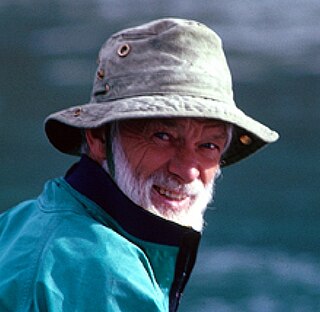
Bill Mason was a Canadian naturalist, author, artist, filmmaker, and conservationist, noted primarily for his popular canoeing books, films, and art as well as his documentaries on wolves. Mason was also known for including passages from Christian sermons in his films. He was born in 1929 in Winnipeg, Manitoba, and graduated from the University of Manitoba School of Art in 1951. He developed and refined canoeing strokes and river-running techniques, especially for complex whitewater situations. Mason canoed all of his adult life, ranging widely over the wilderness areas of Canada and the United States. Termed a "wilderness artist," Mason left a legacy that includes books, films, and artwork on canoeing and nature. His daughter Becky and son Paul are also both canoeists and artists. Mason died of cancer in 1988.
High Grass Circus is a 1976 National Film Board of Canada documentary film co-directed by Tony Ianzelo and Torben Schioler, exploring life in the Royal Brothers' traveling circus. It was shot in the spring and summer of 1975 and part of 1976, and had a budget of $62,008.

The Romance of Transportation in Canada is a 1952 animated short film made by the National Film Board of Canada. Part of the postwar Canada Carries On series, it offers a humorous account of the history of transportation in Canada. The film was directed by Colin Low and produced by Tom Daly.

Drylanders is a 1962 Canadian Western film directed by Don Haldane and Written by M. Charles Cohen and starring Frances Hyland and James B. Douglas. It was the National Film Board of Canada's first English-language feature film and its earliest entry outside of the documentary format.
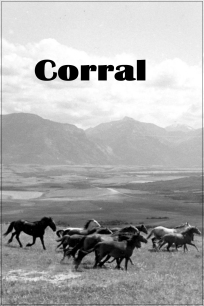
Corral is a 1954 National Film Board of Canada (NFB) short film documentary about the life of a cowboy, directed by Colin Low and produced by Tom Daly. It featured cinematography by Wolf Koenig and a musical score by Eldon Rathburn, and was produced as part of the NFB's postwar Canada Carries On series.
Hot Stuff is a 1971 animated short directed and animated by Zlatko Grgic and written by Don Arioli. Produced by the National Film Board of Canada for the Dominion Fire Commission, a department of Public Works Canada, the nine-minute short on fire safety offers a humorous look at the origins, benefits and dangers of fire.
Canada Carries On was a series of short films by the National Film Board of Canada which ran from 1940 to 1959. The series was created as morale-boosting propaganda films during the Second World War. With the end of the war, the series lost its financial backing from the Wartime Information Board, but continued as an NFB series of theatrical shorts that included newsreels as well as animated shorts.
Fields of Sacrifice is a 1964 documentary by Donald Brittain about Canadian war dead. The film visits former battlefields where over 100,000 Canadian soldiers lost their lives in World War I and World War II and examines Canadian military cemeteries and memorials from Hong Kong to Sicily.
Death of a Legend is a 1971 documentary directed by Bill Mason for National Film Board of Canada.

Blake is a 1969 Canadian short documentary film produced by the National Film Board of Canada (NFB). The film was directed by Bill Mason, and his fellow filmmaker Blake James, who pilots his own aircraft and lives by a unique code. Blake is Mason's cinematic testimonial to his friend and his "hobo of the skies" lifestyle.

The Home Front is a 10-minute 1940 Canadian documentary film, made by the National Film Board of Canada (NFB) as part of the wartime Canada Carries On series. The film was produced and directed by Stanley Hawes.
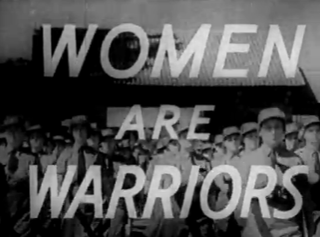
Women Are Warriors is a 14-minute 1942 Canadian documentary film, made by the National Film Board of Canada (NFB) as part of the wartime Canada Carries On series, and dealt with women in war. The film was produced by Raymond Spottiswoode and written and directed by Jane Marsh. The film's French version title is Les Femmes dans la mêlée.

Portrait of Canada is a 10-minute 1959 Canadian documentary film, made by the National Film Board of Canada (NFB) as part of the postwar Canada Carries On series. The film, directed by Guy Glover, described the creation of the All Canadian Atlas. The film's French version title is L'Atlas du Canada.

Screaming Jets is an 11-minute 1951 Canadian documentary film, made by the National Film Board of Canada (NFB) as part of the postwar Canada Carries On series. The film, directed by Jack Olsen and produced by Sydney Newman, depicted the contemporary Canadian and international aircraft in production and on the drawing boards. The film's French version title is Avions à réaction.

Inside Fighting Canada is an 11-minute 1942 Canadian documentary film, made by the National Film Board of Canada (NFB) as part of the wartime Canada Carries On series. The film, written and directed by Jane Marsh and produced by James Beveridge, was an account of the Canadian military during the Second World War. The film's French version is titled Canada en guerre.
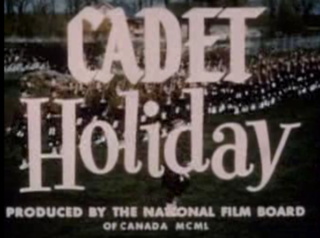
Cadet Holiday is an 11-minute 1951 Canadian documentary film, made by the National Film Board of Canada (NFB) as part of the postwar Canada Carries On series. The film, directed by David Bairstow, Robert Humble and Douglas Wilkinson, was produced by Sydney Newman and Michael Spencer. Cadet Holiday was an account of a Canadian Army Cadet during a summer camp. The film's French version title is Cadets en vacances.

Heroes of the Atlantic is a 1941 15-minute Canadian short documentary film, part of the Canada Carries On series of wartime films by the National Film Board of Canada (NFB), produced for the Office of Public Information. The film documented the work of the Royal Canadian Navy and the Merchant Marine during the Battle of the Atlantic in the Second World War. Heroes of the Atlantic was directed by J.D. Davidson and produced by Stanley Hawes.

Bombing the Nazis is a 10-minute 1943 Canadian documentary film, made by the National Film Board of Canada (NFB) as part of the World War II newsreels shown at theatres in Canada and abroad. The film describes the Allied air war over Europe during the Second World War, concentrating on attacks in 1942 and 1943 on an automobile factory in Vichy France.

Air Cadets is a 15-minute 1944 Canadian documentary film, made by the National Film Board of Canada (NFB) as part of the wartime Canada Carries On series. The film describes the Air Cadet Movement in 1944 during the Second World War. Air Cadets was directed by Jane Marsh, who was also the writer and editor on the production. The film's French version title is Les Cadets de l'air.
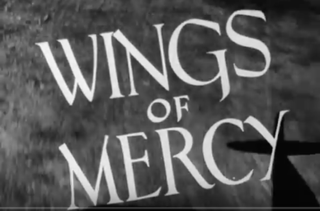
Wings of Mercy is a 21-minute 1947 Canadian documentary film made by the National Film Board of Canada (NFB), written, directed and produced by the team of Evelyn Spice Cherry and her husband, Lawrence. The film describes the formation and operational use of the Saskatchewan Air Ambulance service. The NFB production was later re-edited into a shorter, 11-minute film, Mercy Flight, released in 1948.
References
- 1 2 "Cry of the Wild". Canadian Film Encyclopedia. Film Reference Library. Archived from the original on 2007-10-12. Retrieved 2009-11-15.
- ↑ "Cry of the Wild". Collection. National Film Board of Canada. Retrieved 2009-11-15.
- ↑ Thompson, Howard (January 3, 1974). "Life of Wolf Pack Seen in 'Cry of the Wild'". "Movie review", The New York Times . Retrieved 2009-11-15.
- ↑ Wise, Wyndham (2001). Take One's Essential Guide to Canadian Film. University of Toronto Press. p. 53. ISBN 0-8020-3512-4.
- 1 2 Evans, Gary (1991). In the National Interest: A Chronicle of the National Film Board of Canada from 1949 to 1989 . University of Toronto Press. pp. 200. ISBN 0-8020-2784-9.
Death of a Legend mason.
- 1 2 Ohayon, Albert. "Cry of the Wild". Curator's comments. Montreal: National Film Board of Canada. Retrieved 2009-11-15.
- ↑ Ohayon, Albert (2 October 2013). "The NFB's 5 Biggest Box Office Successes". National Film Board of Canada . Archived from the original on 29 January 2024.